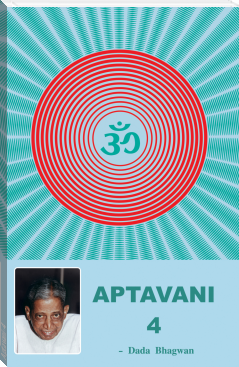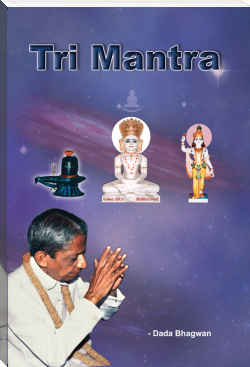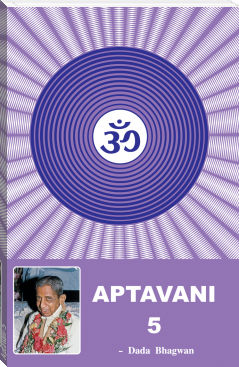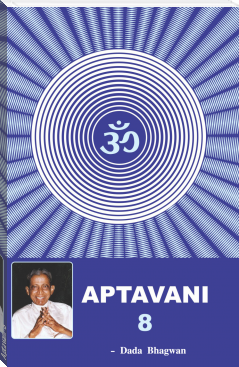Aptavani-4 - Dada Bhagwan (snow like ashes series .txt) 📗

- Author: Dada Bhagwan
Book online «Aptavani-4 - Dada Bhagwan (snow like ashes series .txt) 📗». Author Dada Bhagwan
Religion (dharma) is ‘relative’ and science (vignan) is ‘real’. Science is without controversy; it is with principles that lead to liberation and automatically effective in itself.
[17] Knowing God Through the Vision of Gnan
We are not a portion of God; God cannot be fragmented. We are complete and absolute. It is only a matter of time for the veil of ignorance to be removed and the Self to express!
If God is in every particle, then where should we look for Him? Where can we defecate? And if this were so, then there would be no difference, between the inanimate(jada; lifeless) and the animate(chetan; living). God is in each and every living being.
Where the ownership of something is established and if its removal causes the owner pain, it is called sankalpi-chetan. In fact, both Gnan (knowledge) and vision(darshan) are present in the chetan.
[18] Understanding the Knower
Three things are necessary for the path of moksha:
1. An intense desire to attain the Soul (Atma; Self).
2. An intense desire to meet and know a Gnani Purush.
3. If one cannot meet the Gnani Purush, then to continue to have the profound intention to meet him.
~ Gnani Purush Dadashri
When one says, “I ‘see’ all the living beings in the universe as Godly forms (Bhagwat swaroop)”, then it would also include all the ‘relative’ religions of the world. The Self can be studied (swadhyaya) once the Self is known. Whatever is done without knowing the Self is the study of paradhyaya (study of the non-Self)!
It is considered as awakening to the Self, when that which was believed to be the ‘Knower’ (Gnata) for an infinite period of time, comes to be known as gneya (that which is to be known).
Liberation from ignorance of the Self is the religion of moksha (moksha dharma). After liberation from ignorance, the science ( vignan)that arises is moksha!
[19] The True Path of Worship
Until the God that sits resplendently within, is experienced directly (pratyaksh darshan), the indirect (paroksh) prayer of someone who sits in front of an idol, will reach the present God. For that reason:
‘Oh Vitarag Lord! You reside within me, but I am unable to experience that; therefore, I am doing Your darshan. The GnaniPurush has taught me this, so I am doing the darshan accordingly. Please grant me Your grace so that I may know ‘my’ own ‘Self’.’ ~ Gnani Purush Dadashri
This is how the darshan should be done everywhere.
For the purpose of attaining God, whatever is done through the five senses, is bhakti (worship). One can attain God by doing direct worship( pratyaksh bhakti). With indirect worship (paroksh bhakti), there is a gradual progress upwards. Direct worship means to worship the one in whom God has manifested fully. This will result in moksha.
There are subtle differences in worship. The chanting of a name (naam jaap), is overt worship; veneration of the idol is subtle worship ( sookshma bhakti); with dravya (worship with the external physical substances) is subtler worship, and the subtlest worship is, that which is done with intent (bhaav).
Does moksha occur by following the path of worship, or by following the path of knowledge? When one rail of the path of knowledge is laid and there is another rail of the path of worship, parallel to it, then this train will reach moksha! As much knowledge that is attained that much worship will spontaneously arise. Worship done without the knowledge of the Self yields its results for the worldly life; however, when both (Self knowledge and worship) are done together, there is attainment of moksha! Where the intellect creeps into worship, it becomes a worldly form of worship (apara-bhakti). Nevertheless, the highest form of worship is the worship of the Self (para-bhakti), and the result of that is moksha (Final Liberation). The manifestation of this highest form of worship is the priceless gift of the Akram marg (the step-less path to Liberation)!
[20] The Guru and The Gnani
Once a person establishes his guru (religious leader, teacher, guide), that guru should not be denounced even if circumstances indicate that he may be delirious. Not only should there be no criticism, but there should not be even a single negative thought about him; this would be considered a tremendous disservice. It can take one all the way to hell.
The one who teaches you what is good and what is bad in the world is a guru. And the one who frees you from good and bad, and places you in the pure ( shuddha), Self, is a Gnani.
How much need is there for a guru? Without a guru, not even the alphabet can be learned. So then, how can one worship God without a guru? Even if a person wants to go to a railway station, and is lost, he will need a ‘guru’. A guru is needed, every step of the way. But for moksha, only a Gnani is needed!
Where there is no ‘doership’ left, there is the grace of the Gnani. The one who bestows liberation(mukti) is a Gnani.
A true worldly guru is the one who points you to the right path, just like a ‘point man’. Those who change the course of the path and lead you in the wrong direction are the gurus of today’s world. ‘Guru’ means heavy. And ‘heavy’ means that not only does he drown himself, but he also drowns others who sit in the same boat with him. If a guru has a ‘guru-key’ (gurukilli); he does not let his disciples drown. “I am the disciple of the whole world,” is the gurukilli! The one who does not have the awareness of, ‘this is my disciple’, even for a second, has the authority to make disciples.
Once the guru’s place is established in the heart, the true disciple will not refute any adverse developments in the guru’s behavior, speech or even his delirious or crazed state. Only one’s uninterrupted sincerity will take one to moksha! It is very treacherous to refute the guru after accepting him as your guru. The guru is the fifth ghati (destroyer) karma. No one should see anything negative in his guru; otherwise, it is better not to accept the guru in the first place. It is acceptable for one to not be devoted to one’s guru, but one must not refute him. Human beings nowadays, have this affliction from their previous lives: they cannot remain quiet, they cannot refrain from finding faults in the guru, or even criticizing him!
You do not make someone a guru; the guru happens to you. The one who settles and pleases your heart, as soon as you cast your eyes on him, is the one that should establish the ‘guru’s place’ in your heart. Otherwise, who has developed the ability to examine and establish the guru?
The one who helps you to walk the auspicious path in this world is the guru, and the one who gives direct moksha is the Gnani!
[21] The Purpose of Penance
How much need is there for chanting of mantra (japa), penance(tapa) or for vrat (taking religious vows)? Do you use all the medicines from the pharmacy? Only those that are prescribed for you are the right ones. However, there is no reason to say that the other medicines are wrong. There are other ‘patients’ for whom chanting mantra and penance, etc., result in binding auspicious karma.
The current time is not one for doing penance through insistence or even deliberately. This is the time to do penance that comes naturally before you, and to settle it with equanimity. For those people who, because of the lack of the effect of merit karma, when there is a shortage of grain, kerosene, sugar and milk, they distress over it day and night: what more penance can there be?
For the Gnani, renunciation or acquisition is not possible. He will settle with whatever circumstance that may come before him! The Lord did not say that the renunciation of material things is renunciation. He has said that the renunciation of intense attraction (murchha) for material things is renunciation. God will only see the root cause of the problem!
The one who can do the agiyaras (observance of fasting done on the eleventh day of the lunar cycle), in accordance with the revered Dadashri’s instructions and approval, will definitely attain salvation. True agiyaras is when the gnanendriya (Five senses; Sense organs of knowledge namely: hearing-ears, touch-skin, sight-eyes, taste-tongue, and smell-nose), karmendriya (five organs of action) and the mind ( mun), as the eleventh ‘sense’, are deprived of ‘food’. If the ‘fast’ is done with the right applied awareness(upayog), the mind, body and speech will be purified! Aayambil,eating food made from only one variety of grain, should be done with discretion and limitation, by the person that practices it. It is useful for a person to fast, if he suffers from indigestion, until his indigestion is cured.
As a matter of fact, the Self is such, that it cannot be found through the practice of penance, chanting or fasting.
There is no penance like unodari (eating less food than what one has appetite for). Dadashri did not fast even once in his life. Yes, but for his entire life, he did unodari.
What is the result of fasting if after a hundred thousand fasts, the kashays (anger, pride, deceit and greed) are not gone? Tremendous loss is incurred if one fasts and does kashays at the same time. If food is not available till two o’clock, tell the mind, ‘Today is the day for fasting’ and remain in equanimity. There is no other fast like it!
[22] Worldly Religions
If there is even the subtlest desire in religion, then that religion is not religion; it is a business!
He who earns in the ‘relative’: loses in the ‘real’. There should be no robbery in religion. The perils are beyond imagination.
Without first understanding the siddhants (irrefutable principles that accomplish the ultimate), that are to be undertaken with devotion and understanding, how can one do spiritual practice(sadhana; spiritual endeavor; undergoing self-discipline for spiritual development)?Moksha and partiality contradict one another. There is no other solution except the words of the Vitarag. It is impossible to attain moksha without a Gnani.
[23] The Goal Is to Attain Moksha
The state of the Siddha is Supreme Soul (Parmatma). Nothing is to be done there. It is the natural state of being the Knower-Seer( Gnata-Drashta), and being in the absolute bliss (parmanand)! There in Siddha gati (location of the Siddhas), one is in eternal and endless bliss.
Moksha is the ‘feeling’ of liberation. Firstly, there is freedom from the worldly miseries. And then there is liberation from all the karma. Moksha is attained from he who is liberated.
Where there is no beggarly need of any kind, such as want or desire for wealth, fame, sexual pleasures, disciples, temples or respect, all the power of the world will become submissive!
Moksha occurs when there is mistake-free understanding. The intellect that is involved with the pudgal (body complex) is indeed the worldly life ( sansar), and the intellect that is submissive only to the Atma (Self) is moksha.
Moksha is not





Comments (0)